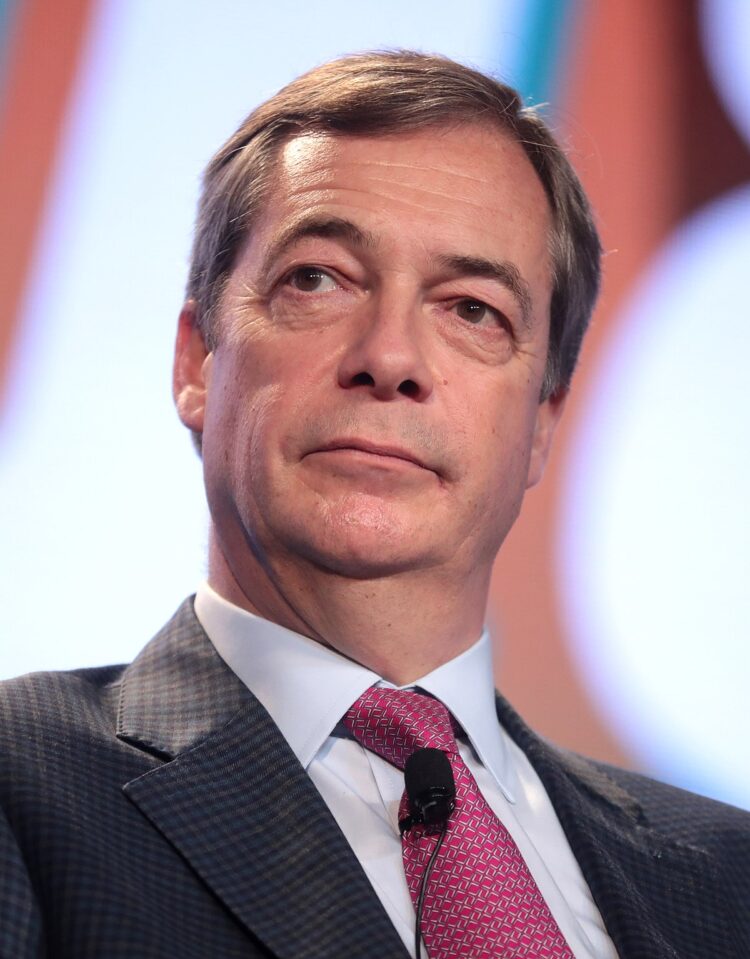By Ben Kerrigan-
Nigel Farage has branded the Financial Conduct Authority conclusion that it has found no evidence of political motivations in debanking outcomes, a “whitewash” and a “joke.”
It follows an investigation by the Watchdog after it launched an inquiry after row over Coutts’ over its handling of Farage’s(pictured) bank account closure
The probe, which covered a 12-month period up to June, was initiated following the high-profile “de-banking” row involving former UKIP leader Nigel Farage and NatWest Group.
The former Ukip leader originally claimed the decision to shut his accounts had been linked to his status as a PEP.
But the UK’s financial regulator found no evidence showing banks have shut or denied accounts to customers based primarily on their political beliefs, according to a preliminary review launched in the wake of the Nigel Farage debanking row.
The announcement is at odds with an apology issued to Mr Farage in July by The head of NatWest at the time apologised to Farage for “deeply inappropriate comments” made about the former Ukip leader in an internal report that led to the closure of his bank accounts .
Dame Alison Rose the issued a public statement and a letter to Farage apologising for the way the NatWest subsidiary had handled its decision to cut ties with the Brexit campaigner.
Despite growing concerns that customers have been quietly discriminated against because of their political views, the Financial Conduct Authority (FCA) said initial findings showed the primary reason for accounts being closed, suspended or denied was either that the account was inactive, or that they had concerns that the customer was involved in financial crime.
“While no bank, building society or payment firm reported to us that they had closed accounts primarily due to someone’s political views, further work is needed for us to be sure,” said the FCA chief executive, Nikhil Rathi.
A separate investigation revealed that there were four account closures where political views were reported to be a factor. After following up on these cases, the FCA said that the decisions were actually related to how those customers behaved towards bank staff.
It found that the most common reasons given for account closures were because an account was inactive or because there were concerns about financial crime.
The FCA said, however, that further work will be undertaken to verify the data, in particular where accounts were closed due to “reputational risk”.
That will involve verifying the initial data gathered from 34 banks, building societies and payment companies, covering the year to June, including cases in which accounts were closed because the customers posed a “reputational risk”.
Background: The De-Banking Controversy
The “de-banking” controversy first came to light when NatWest Group’s Coutts arm closed accounts belonging to Nigel Farage. This move triggered public outrage and accusations that banks were discriminating against customers based on their political views.
The incident prompted the FCA’s investigation and fueled a larger conversation about the responsibilities of financial institutions in protecting freedom of expression.
The FCA’s investigation, which covered practices at 34 lenders, sought to determine whether any banks had closed accounts primarily due to a customer’s political views.
In its report, the FCA stated that the evidence it had gathered “suggests that no firm closed an account between July 2022 and June 2023 primarily because of a customer’s political views.”
The regulator also noted that it planned to collaborate further with banks, building societies, and payment companies to verify the data provided and to gain a deeper understanding of the reasons behind account closures related to reputational risk.
Nigel Farage vehemently rejected the FCA’s findings, asserting that the report was a “whitewash” and questioning the effectiveness of the regulator. Farage’s response highlights the ongoing tension between freedom of expression and the actions of financial institutions, as well as the broader implications of the investigation’s outcomes.
The Role of Government and Policy Changes
The FCA’s report comes on the heels of warnings from the UK Chancellor that banks could face “very large” fines if they closed customer accounts based on political opinions. The Treasury also unveiled reforms aimed at compelling banks to be more transparent about account closures.
However, the FCA’s findings suggest that the government may have acted prematurely in implementing these measures.
The Future of Freedom of Expression and Banking Access
The FCA’s report raises critical questions about the balance between freedom of expression and the actions of financial institutions. The regulator’s CEO, Nikhil Rathi, emphasized that further work is needed to validate the findings fully.
Additionally, Rathi suggested a broader debate about the right to access bank accounts and the role of digital identities in countering financial crime and enhancing financial inclusion. These discussions may shape future policies that impact individuals, businesses, and organizations.
Economic secretary to the Treasury Andrew Griffith stressed the importance of free speech as a fundamental human right and affirmed the government’s commitment to protecting it.
Griffiths noted that legislative measures would reinforce this commitment by requiring banks to explain and delay account closures related to freedom of expression.




